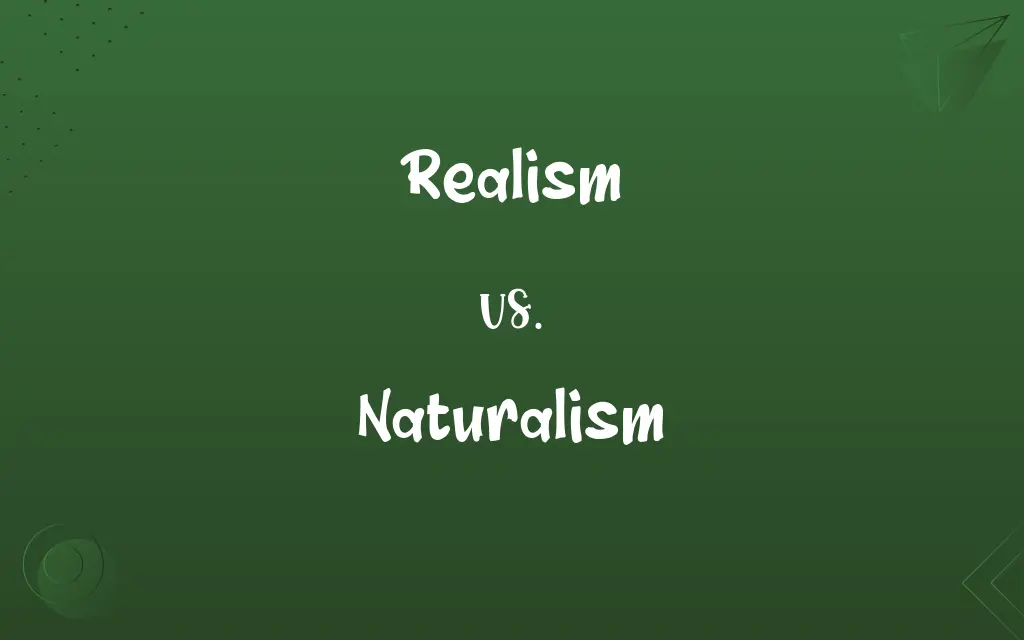Realism vs. Naturalism: Know the Difference

By Shumaila Saeed || Published on January 11, 2024
Realism is an artistic movement focused on depicting everyday experiences and society accurately, while Naturalism is a subset of Realism that emphasizes a more detailed, unvarnished portrayal of reality, often influenced by scientific perspectives.

Key Differences
Realism, an artistic and literary movement, aims to represent subjects as they appear in everyday life, without embellishment or interpretation. The focus is on mundane, everyday experiences and the societal norms of the time. Naturalism, a branch of Realism, takes this a step further by applying a more scientifically analytical approach to these representations. It delves deeper into the influences of environment and genetics on human behavior.
Shumaila Saeed
Jan 11, 2024
In Realism, the portrayal of reality is direct and unidealized, showing life’s practical and often harsh realities. Characters and settings are typical and believable, reflecting common experiences. In contrast, Naturalism frequently portrays the darker or more grim aspects of life, emphasizing the deterministic nature of human existence. It often suggests that social conditions, heredity, and environment have inescapable force in shaping human character.
Shumaila Saeed
Jan 11, 2024
Realist works tend to focus on the ethical choices and dilemmas faced by ordinary people, offering a critical view of society and its institutions. Naturalism, however, often implies that humans have limited control over their own lives, with outcomes determined by external forces beyond their control. This philosophical approach in Naturalism is heavily influenced by theories of evolution and determinism.
Shumaila Saeed
Jan 11, 2024
Realism is characterized by detailed descriptions and complex characters who deal with everyday struggles and moral questions. Naturalist works, however, often have characters who are victims of forces beyond their control, emphasizing how environment, family history, and social conditions dictate human behavior. The tone in Naturalism tends to be more pessimistic than that of Realism.
Shumaila Saeed
Jan 11, 2024
In summary, while both Realism and Naturalism share a commitment to depicting life accurately, Realism focuses more on social reality and the human condition, whereas Naturalism tends to present a more deterministic and scientific perspective on reality. Naturalism often portrays life’s struggles in a more fatalistic manner, influenced by biological and environmental determinants.
Shumaila Saeed
Jan 11, 2024
ADVERTISEMENT
Comparison Chart
Focus
Accurate depiction of everyday life and society
Detailed portrayal of reality with an emphasis on science and determinism
Shumaila Saeed
Jan 11, 2024
Influence
Social and ethical contexts
Scientific perspectives, including determinism and evolution
Shumaila Saeed
Jan 11, 2024
Characterization
Complex characters facing moral dilemmas
Characters often depicted as victims of environmental and genetic forces
Shumaila Saeed
Jan 11, 2024
Tone
Critical but neutral, focusing on societal norms
Often pessimistic, highlighting life’s grim aspects
Shumaila Saeed
Jan 11, 2024
Philosophy
Reflects on ethical choices and societal structures
Suggests limited human control, influenced by external forces
Shumaila Saeed
Jan 11, 2024
ADVERTISEMENT
Realism and Naturalism Definitions
Realism
Focus on believable characters and settings.
In Realism, a painting might accurately portray a bustling city scene.
Shumaila Saeed
Dec 16, 2023
Naturalism
Focuses on the darker, more grim aspects of life.
A Naturalist play might depict the inescapable struggles of poverty.
Shumaila Saeed
Dec 16, 2023
Realism
Rejects idealization and romanticized views of life.
A Realist play would show the complexities of ordinary life without embellishment.
Shumaila Saeed
Dec 16, 2023
Naturalism
Characters often portrayed as products of their surroundings and biology.
In Naturalism, a story may depict a protagonist’s actions as determined by their socio-economic background.
Shumaila Saeed
Dec 16, 2023
Realism
Maintains a neutral tone, avoiding exaggerated emotions.
Realist artwork typically avoids dramatic or overly emotional scenes.
Shumaila Saeed
Dec 16, 2023
ADVERTISEMENT
Naturalism
Suggests limited control over one's fate.
Naturalist narratives often show characters trapped by their circumstances.
Shumaila Saeed
Dec 16, 2023
Realism
Artistic representation of everyday life in a true-to-life manner.
A Realist novel might depict the daily struggles of a middle-class family.
Shumaila Saeed
Dec 16, 2023
Naturalism
An extension of Realism with a more scientific and deterministic approach.
A Naturalist novel might explore the impact of heredity and environment on a character's life.
Shumaila Saeed
Dec 16, 2023
Realism
Emphasizes ethical dilemmas and social issues.
Realist literature often tackles societal issues like poverty and class.
Shumaila Saeed
Dec 16, 2023
Naturalism
Incorporates themes of survival, determinism, and degradation.
A Naturalist piece of art might starkly portray the struggle for survival in a harsh environment.
Shumaila Saeed
Dec 16, 2023
Naturalism
The practice of describing precisely the actual circumstances of human life in literature.
Shumaila Saeed
Dec 13, 2023
Realism
The representation in art or literature of objects, actions, or social conditions as they actually are, without idealization or presentation in abstract form.
Shumaila Saeed
Dec 13, 2023
Naturalism
The practice of reproducing subjects as precisely as possible in the visual arts.
Shumaila Saeed
Dec 13, 2023
Realism
The scholastic doctrine, opposed to nominalism, that universals exist independently of their being thought.
Shumaila Saeed
Dec 13, 2023
Realism
The modern philosophical doctrine, opposed to idealism, that objects exist independently of their being perceived.
Shumaila Saeed
Dec 13, 2023
Naturalism
The principles and methods of such a movement or of its adherents.
Shumaila Saeed
Dec 13, 2023
Realism
A concern for fact or reality and rejection of the impractical and visionary.
Shumaila Saeed
Dec 13, 2023
Naturalism
(Philosophy) The system of thought holding that all phenomena can be explained in terms of natural causes and laws.
Shumaila Saeed
Dec 13, 2023
Naturalism
(Theology) The doctrine that all religious truths are derived from nature and natural causes and not from revelation.
Shumaila Saeed
Dec 13, 2023
Realism
(sciences) The viewpoint that an external reality exists independent of observation.
Shumaila Saeed
Dec 13, 2023
Realism
(philosophy) A doctrine that universals are real—they exist and are distinct from the particulars that instantiate them.
Shumaila Saeed
Dec 13, 2023
Realism
As opposed to nominalism, the doctrine that genera and species are real things or entities, existing independently of our conceptions. According to realism the Universal exists ante rem (Plato), or in re (Aristotle).
Shumaila Saeed
Dec 13, 2023
Naturalism
The doctrine that denies a supernatural agency in the miracles and revelations recorded in religious texts and in spiritual influences.
Shumaila Saeed
Dec 13, 2023
Realism
Fidelity to nature or to real life; representation without idealization, and making no appeal to the imagination; adherence to the actual fact.
Shumaila Saeed
Dec 13, 2023
Naturalism
(philosophy) Any system of philosophy which refers the phenomena of nature as a blind force or forces acting necessarily or according to fixed laws, excluding origination or direction by a will.
Shumaila Saeed
Dec 13, 2023
Realism
The practise of assessing facts and the probabilities of the consequences of actions in an objective manner; avoidance of unrealistic or impractical beliefs or efforts. Contrasted to idealism, self-deception, overoptimism, overimaginativeness, or visionariness.
Shumaila Saeed
Dec 13, 2023
Naturalism
(philosophy) A doctrine which denies a strong separation between scientific and philosophic methodologies and/or topics
Shumaila Saeed
Dec 13, 2023
Realism
The attribute of accepting the facts of life and favoring practicality and literal truth
Shumaila Saeed
Dec 13, 2023
Naturalism
(arts) A movement in theatre, film, and literature that seeks to replicate a believable everyday reality, as opposed to such movements as romanticism or surrealism, in which subjects may receive highly symbolic or idealistic treatment.
Shumaila Saeed
Dec 13, 2023
Realism
(philosophy) the philosophical doctrine that physical object continue to exist when not perceived
Shumaila Saeed
Dec 13, 2023
Realism
The state of being actual or real;
The reality of his situation slowly dawned on him
Shumaila Saeed
Dec 13, 2023
Realism
An artistic movement in 19th century France; artists and writers strove for detailed realistic and factual description
Shumaila Saeed
Dec 13, 2023
Realism
(philosophy) the philosophical doctrine that abstract concepts exist independent of their names
Shumaila Saeed
Dec 13, 2023
Naturalism
The doctrine of those who deny a supernatural agency in the miracles and revelations recorded in the Bible, and in spiritual influences; also, any system of philosophy which refers the phenomena of nature to a blind force or forces acting necessarily or according to fixed laws, excluding origination or direction by one intelligent will.
Shumaila Saeed
Dec 13, 2023
Naturalism
The theory that art or literature should conform to nature; realism; also, the quality, rendering, or expression of art or literature executed according to this theory.
Shumaila Saeed
Dec 13, 2023
Naturalism
The principles and characteristics professed or represented by a 19th-century school of realistic writers, notably by Zola and Maupassant, who aimed to give a literal transcription of reality, and laid special stress on the analytic study of character, and on the scientific and experimental nature of their observation of life.
Shumaila Saeed
Dec 13, 2023
Naturalism
(philosophy) the doctrine that the world can be understood in scientific terms without recourse to spiritual or supernatural explanations
Shumaila Saeed
Dec 13, 2023
Naturalism
An artistic movement in 19th century France; artists and writers strove for detailed realistic and factual description
Shumaila Saeed
Dec 13, 2023
Repeatedly Asked Queries
When did realism emerge as a literary movement?
Realism became prominent in the mid-19th century, especially in the 1850s and 1860s.
Shumaila Saeed
Jan 11, 2024
Who are some famous realist authors?
Prominent realist authors include Gustave Flaubert, Leo Tolstoy, and Henry James.
Shumaila Saeed
Jan 11, 2024
Is realism limited to literature, or does it extend to other art forms?
Realism extends to various art forms, including painting and theater, where it seeks to depict reality faithfully.
Shumaila Saeed
Jan 11, 2024
What role does detail play in realistic literature?
Detail is crucial in realism, as it helps create a vivid and authentic portrayal of the world.
Shumaila Saeed
Jan 11, 2024
What is realism in literature?
Realism in literature is a literary movement that seeks to depict everyday life and experiences in a truthful and objective manner.
Shumaila Saeed
Jan 11, 2024
How does realism differ from romanticism?
Romanticism focuses on imagination and emotion, whereas realism emphasizes objective and factual representation.
Shumaila Saeed
Jan 11, 2024
What is the main goal of realism in literature?
Realism aims to present life as it truly is, focusing on accurate depictions of characters, settings, and social conditions.
Shumaila Saeed
Jan 11, 2024
Is realism concerned with idealized or romanticized portrayals?
No, realism rejects idealized or romanticized portrayals and emphasizes the ordinary and mundane aspects of life.
Shumaila Saeed
Jan 11, 2024
What are some common themes in realistic literature?
Common themes in realism include class, social issues, morality, and the human condition.
Shumaila Saeed
Jan 11, 2024
Is realism still relevant in contemporary literature?
Yes, realism continues to influence and inspire contemporary literature and art.
Shumaila Saeed
Jan 11, 2024
When did naturalism emerge as a literary movement?
Naturalism gained prominence in the late 19th and early 20th centuries.
Shumaila Saeed
Jan 11, 2024
Who are some notable naturalist authors?
Prominent naturalist authors include Emile Zola, Stephen Crane, and Frank Norris.
Shumaila Saeed
Jan 11, 2024
What distinguishes naturalism from realism?
Naturalism takes realism a step further by examining how natural forces and determinism shape characters' lives.
Shumaila Saeed
Jan 11, 2024
What role does science and Darwinism play in naturalist literature?
Naturalist literature often incorporates scientific principles, including Darwin's theory of evolution, to explain human behavior.
Shumaila Saeed
Jan 11, 2024
Are there any moral or ethical concerns addressed in naturalist literature?
Naturalism often explores moral dilemmas and ethical questions in the context of a deterministic world.
Shumaila Saeed
Jan 11, 2024
Is naturalism known for its optimistic or pessimistic outlook?
Naturalism tends to have a more pessimistic view of human nature, emphasizing the harsh and deterministic aspects of life.
Shumaila Saeed
Jan 11, 2024
How does naturalism explore the concept of free will?
Naturalism suggests that characters have limited free will due to their biological and environmental influences.
Shumaila Saeed
Jan 11, 2024
What is naturalism in literature?
Naturalism in literature is an extension of realism that emphasizes the influence of environment and heredity on human behavior.
Shumaila Saeed
Jan 11, 2024
What are some common settings in naturalist literature?
Naturalist literature often features urban slums, factories, and other gritty, oppressive environments.
Shumaila Saeed
Jan 11, 2024
Is naturalism still relevant in contemporary literature?
While less dominant than in the past, naturalism's themes and ideas continue to influence modern literature, particularly in exploring the darker aspects of human existence.
Shumaila Saeed
Jan 11, 2024
Share this page
Link for your blog / website
HTML
Link to share via messenger
About Author
Written by
Shumaila SaeedShumaila Saeed, an expert content creator with 6 years of experience, specializes in distilling complex topics into easily digestible comparisons, shining a light on the nuances that both inform and educate readers with clarity and accuracy.

































































